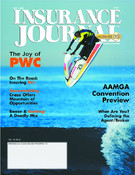Bud Wilson, past president of the Independent Insurance Agents of America, has said to agents: “Choose your companies wisely.”
Interpreted broadly, the argument supports any company providing competitive prices and fair compensation to agents.
Read literally, the argument says multiple-distribution companies by their very nature can’t be complete partners. These companies tinker with alternative distribution as a child moves from one toy to another, Bud has said, and they should be investing to make agents more successful, because most consumers prefer an agent in the first place.
A couple of guys at Mercury Insurance Co. would prefer the literal read. George Joseph and Bruce Norman (who between them have four first names-go ahead, count ’em) are expanding the company to more eastern states. Joseph is CEO and Norman is marketing VP of the Los Angeles-based company. Mercury has a single product line: car insurance, and a single distributor: the independent agent.
Mercury books about $1.2 billion in premium in California, Florida, Georgia, Illinois, Oklahoma and Texas, and is coming this year to Virginia and New York. Joseph is thinking of some others. “We have a lot on our plate right now,” he said.
This isn’t a fun time to be expanding in car insurance, unless you have buckets of marketing dollars to take market share at a loss. Policy count growth is difficult. Prices are inching up, but not fast. The field is crowded in the states in which everyone else wants to sell. Plus, Mercury is asking agents to learn new software. (Talk to the hand; the face is busy, agents might say.)
Yet Mercury plods along, and if nothing else Joseph and Norman are persistent people. How do we know this? Because Joseph himself formed the company 40 years ago (he started in the insurance biz in 1949) and has been at this one job ever since. Norman has been there 29 years. Now that’s plodding. Smirk all you want-while most car insurers are turning in combined ratios (losses and expenses before investment income) of 105-plus for 1999, Mercury was at 93. Can the tortoise win this race?
Joseph said he hasn’t seen a more competitive market. In recent years, carriers “that had been in the business for a while expanded their marketing efforts, and some new ones got in that didn’t understand the business real well and have been underpricing their coverage for years. You’re seeing some bad (financial) reports come up.”
Norman noted that one direct response company spent $5 or $6 million in advertising to book 7,000 policyholders. “You could have given that business away and saved the money,” he said.
Agents in these new states have a lot of choices where they can place car insurance. Why Mercury, George? “We’re going to pay them more commission and we’re not going to take that customer information from the agent and solicit them directly later through the back door,” he said.
On this last point Norman gets wound up like a top. Multi-distribution players are growing market share at the expense of independent agents, he charged, and their tactics are surreptitious.
“The independent agency system is the lowest cost distribution system. It requires very little investment by the company. In direct you have to build brand name; you have to have advertising, and it’s very expensive. How much are you willing to bleed to get a foot in the door?” Norman asked.
“So [in addition] you enter the agency market where all that infrastructure has been building up for years and years. You build a base [of business]; at the same time you build your direct response. And you build your claims side,” which is no additional expense since you need that anyway for whatever channel(s) you choose. And one day-voila!-you flip the switch and it’s all direct.
Since not all agents necessarily believe that will happen (or want to think about that happening), Norman added: “Independent agents say they don’t like to put all their eggs in one basket. ‘If something happens I need more markets,’ they say. I say, ‘We have all of our eggs in one basket-the independent agency system. Should we have another distribution system?’ Then they say, ‘What we are doing is giving those markets business you don’t want anyway.’
“I say, ‘That isn’t the issue. What you are really doing is feeding the infrastructure so that they can build the scale and efficiencies to compete against you in other distribution channels.'”
For his part, Joseph thinks insurance direct writing is inherently flawed in the first place. “It’s very obvious that to put business on the books using advertising- whether it’s newspapers or radio or TV or Internet or whatever-is becoming very difficult to do. And your loss ratio is much worse than a seasoned book of business. I’m convinced about our ability to compete using independent agents.”
But things aren’t easy in new territories, Norman and Joseph readily acknowledge. A huge obstacle: salaried CSRs don’t like change, especially when the old way appears less painful. When Mercury marched into Florida a few years ago, an initial warm welcome by agencies “was somewhat muted,” Joseph said, “once they found out how difficult our software was, which we’re changing.
“It was a very complex underwriting system they weren’t accustomed to. So obviously the answer is staring us in our faces now. We’ve already updated the software six times in Florida but we will continue to improve it, making it more intuitive. We want to make it just about as easy as our competitors’. We recognize that our underwriting is much more complex so we want to build that complexity into the software so it’s seamless. We hope to get it down to seven or eight minutes from 12 to 15 minutes to complete an app.”
Long term, Joseph wants consumers to view Mercury as a national company. Why? Because when people “think of California they always think of bad things.” (Easy now, George.) “The riots, the earthquakes, the fires, and things like that. We went through that very well with no problem, but it’s better for the company to continue to expand in this line we’ve developed a fair amount of expertise in and to continue to market our product the way we have, which means supporting the independent agent.
“There is no evidence that a company that doesn’t use independent agents can grow profitably for any period of time. Maybe that’ll change; I just don’t think so,” Joseph added. “One of the best underwriting tools you can get is a motivated, knowledgeable agent.”
Peter van Aartrijk, a 20-year insurance industry veteran, owns a communications firm specializing in the independent agent distribution.
Topics Agencies Florida Auto Independent Agencies
Was this article valuable?
Here are more articles you may enjoy.


 Longtime Alabama Dentist Charged With Insurance Fraud in 2025 Office Explosion
Longtime Alabama Dentist Charged With Insurance Fraud in 2025 Office Explosion  GEICO Settles Call-Center Worker Suits for $940,000; Attorneys Get Half
GEICO Settles Call-Center Worker Suits for $940,000; Attorneys Get Half  What Analysts Are Saying About the 2026 P/C Insurance Market
What Analysts Are Saying About the 2026 P/C Insurance Market  Winter Storm Fern to Cause Up to $6.7B in Insured Losses
Winter Storm Fern to Cause Up to $6.7B in Insured Losses 



